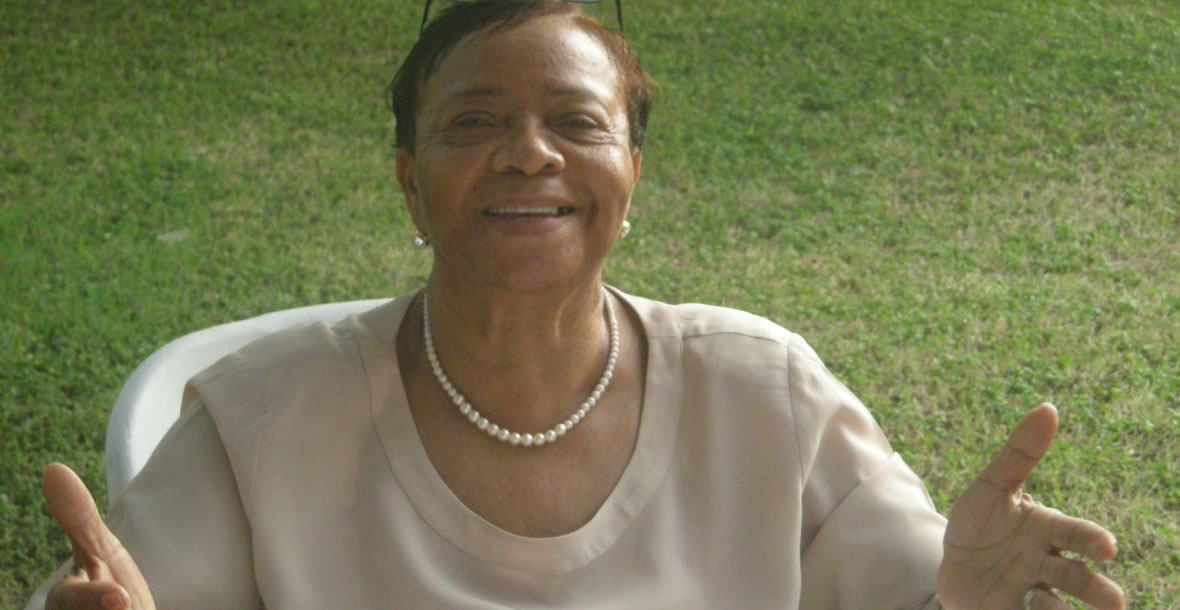Remembering Mrs Lorrice Dacosta

by Dr. Christine Powell, former Senior Lecturer, CAIHR
We honour, celebrate and remember the life of our dear colleague and friend Mrs. Lorrise DaCosta affectionately called Mrs. D. She is one of only a few persons to have contributed to each of the three Jamaica Units of the Caribbean Institute for Health Research, UWI throughout her many years of association.
Mrs. DaCosta was introduced to the Institute by her decades-long friend Prof. Sally McGregor. She joined Sally in her work with parenting interventions for children who were admitted to the TMRU ward with severe malnutrition. Mrs. D worked briefly as a research assistant doing surveys and children’s developmental assessments in the 1980s. However, her most outstanding contributions came later from the social services that she provided.
For many decades the TMRU treated children with severe malnutrition. They were mostly from poor backgrounds, were developing poorly and needed intervention. Mrs. D was responsible for most of the outreach activities to support these families. She developed a workshop which parents would attend once per week while their child was in hospital and even after the child returned home. Together with Community Health Aides, Mrs. Margaret Pitter and later Mrs. Novelette Campbell, she engaged the parents in topics related to child health and nutrition, early stimulation, child abuse and other topics as they requested. The parents cooked together and ate nutritious low cost meals and received food packages when available. Mrs. Campbell remembers her as being very knowledgeable in the advice she gave the parents and that she was very kind-hearted to them. Parents were meant to graduate after attending 10 sessions but the workshop was so popular they became alumni and kept popping in even several years later.
The parenting stimulation program was extended to a community outreach effort through a mobile toy library. Again she willingly stepped in and offered to help. Together with her team of Community Health Aides they took the toy library to several low income communities in Kingston and St Andrew and St Catherine and conducted parenting groups for several years, touching lives through early stimulation for the children and income generating ideas for the families.
Her involvement in the Sickle Cell Unit came about through her personal life-altering journey with the condition. Having experienced the loss of both her daughters to the condition, she became an advocate for sickle cell education and volunteered her services to help other parents, their children and other adults attending the SCU clinic. She and her husband Herman joined the Sickle Cell Trust and Prof Sergeant remembers that in 1986, she was instrumental in getting the legal aspects of the Trust set up.
In 1988, she started working in the Sickle Cell clinic as a genetic counsellor and helped with family welfare services. At one time she even started a breakfast program for those who had spent the night in the University Hospital of the West Indies casualty department and came in to the Unit early and had not had breakfast. She would also source items for patients to help with schooling or for the home. I remember one young man after receiving a stove came back with a long list to completely furnish his home. After carefully considering how to handle the situation, she gently reminded him that the needs were great but there was only so much to go around.
The Institute benefitted from another of her initiatives, the Training Program for Community Health workers. In the late 1990s, Mrs. DaCosta was involved in a training program with Partners of the Americas and the University Hospital to train community health workers to fill roles in health centres, child care institutions and geriatric services. She was able to recruit several ladies who had come out of the St Margaret’s day care centre training program. Many of those graduating from the new program were immediately employed in projects at the Institute. This training had a profound impact on their lives as it opened many doors for them and some went on to pursue tertiary education.
Mrs. D had a knack for fund raising – she had many contacts and was not shy to ask for donations including Mr. DaCosta’s optometrist practice where many were sent for free or discounted glasses. She enjoyed things of beauty such as the lovely artwork that adorned her home and her beautiful garden was a place of peace and calm. We remember many meetings held at her home and how lovely it was to sit on her balcony and enjoy the view of Kingston and the harbour. Others will remember her culinary skills, the masterpiece of which was her mouth-watering carrot cake – never before seen and not equalled since.
Mrs. DaCosta’s life was one dedicated to volunteerism, caring for others, friendship, kindness and service. Her kindness knew no boundaries. She was kind to everyone, rich and poor alike. She gave freely without expecting anything in return. She was soft-spoken, gentle, and compassionate.
Mrs. DaCosta had a great passion for people. Her graciousness and willingness to serve was greatly appreciated by all. Those at the Institute who knew her, remember her with affection. We were truly blessed to have had her in our lives. May her soul rest in peace.
